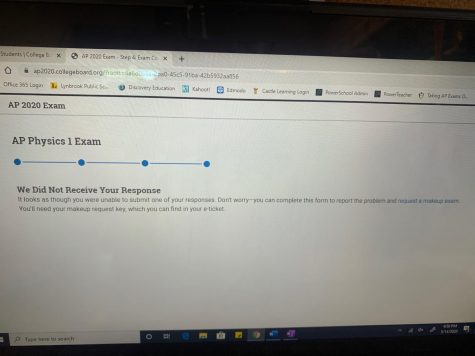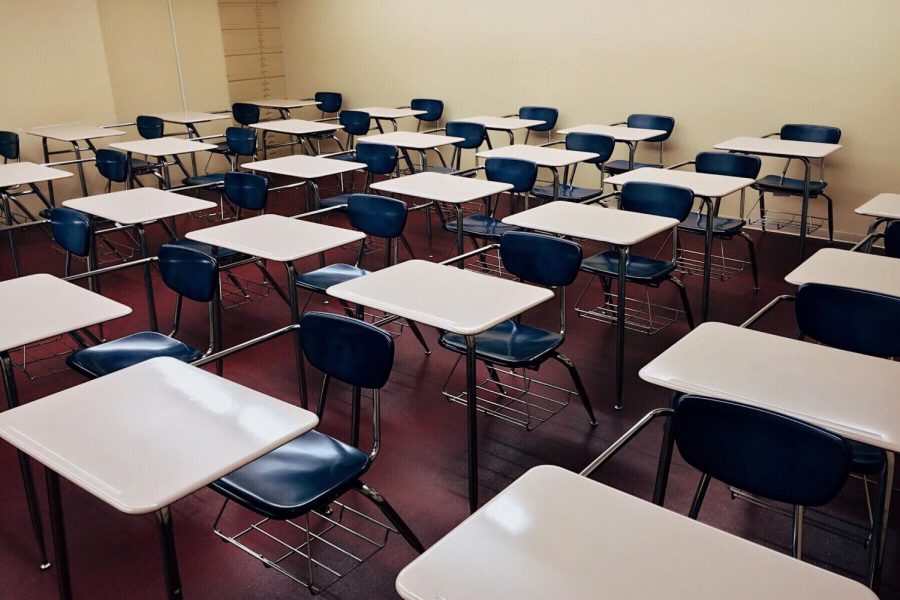At-home AP Exams Drop the Ball
The early months of 2020 have held many surprises: a UFO sighting, the discovery of killer hornets, and a global pandemic, to name a few. Yet, to many American high school students, the most astonishing of all may have been the announcement of at-home Advanced Placement (AP) exams and the many obstacles that come with them.
For the past several weeks, LHS students have been adjusting to modified education standards and testing methods due to the closing of schools. With AP exam week finally here, the pressure built from distance learning has reached its peak.
AP exams are administered by The College Board, the same organization that creates the SATs. Typically, the tests are approximately three hours—featuring multiple choice, free response, and essay questions—and are taken at school. This year, to accommodate the unprecedented circumstance of at-home learning, the AP has been modified to a completely different format, one that has some students asking, “Did I really just spend seven months in this AP class to take a 45-minute at home, open-notes test?”
To elaborate, the tests are now online assessments, composed of one or two free response questions and are only 45 minutes long. Some high schools, LHS included, have decided to make the exams optional, meaning students who opt to not take the exam can still receive a weighted grade in an AP class. Students are allowed to use their notes and the Internet but are prohibited from sharing or receiving answers from other people.
The College Board is so wary of cheating this year due to students’ Internet and social media availability that they have gone so far as to post fake test answers from anonymous accounts. Many students are tumbling into the trap, finding the “test answers” and using them in their exam responses. Students caught cheating have their scores invalidated and colleges are notified of their fraudulent activity.
The reason many students resort to cheating this year can be attributed to several factors: Internet access (an obvious one), unfamiliarity with the new format, the absence of a proctor, and the lack of formal review before the exam.
All year, students have been trained to answer AP questions in the traditional format. They were informed only a few weeks ago of the new format, which threw many people a curve ball. Additionally, students are used to the cheating deterrent of a teacher’s scornful face scouring the room for wandering eyes. This year, exams are taken from the comfort of home, so there is minimum pressure to preserve the moral code. Furthermore, the weeks preceding AP season are usually chock-full of review sessions to go over material. However, this year, students were left to review on their own, without the help of a teacher by their side.
AP Psychology Teacher John Cornicello shared, “It was incredibly difficult to review via distance learning; I have had the same couple of students attend each review session, but there were plenty of students whom I never got a chance to interact with; how will those students do on these tests? I honestly do not know.”
Senior Andrea Glanzer agrees that it is difficult to have motivation when studying for AP tests at home. She commented, “Going into school every day and talking with friends helps motivate me to study, but since I don’t have that anymore, it is a lot harder to work purely out of self-discipline.”
What happens to the students that live in a single-parent household and are responsible to care for their younger sibling? What about those who do not have access to a quiet testing space because they live in a noisy apartment or duplex? In spite of these obstructions and distractions, students are expected to take and pass the exam. Many students use high AP scores to cushion their college applications, or even to gain college class credit. Losing out on this opportunity could make-or-break those graduating this spring or those in need of additional scores.

To make matters worse, more than one thousand students across the country, approximately 2% of those taking the AP, have reported being unable to submit their exams after anxiously forming their responses. Rather than issuing a tech support phone number or contact, The College Board has merely provided a retake test date. Now, students who experience a glitch have to wait and review material for another month before having the chance to submit their exam.
Junior Mackensi Deninno experienced this technical difficulty and was unable to submit her response after working hard to write it: “I was taking my exam, and I followed the directions from The College Board. I even used tips that the school gave me, but when I emailed the picture to my tablet, the image wouldn’t save to my desktop, and it kept showing an error. I started panicking as I tried to log into iCloud, but nothing worked fast enough, and I ran out of time.”
Cornicello expressed reasonable concern about the prospect of his students not being able to upload their answers. The College Board explained to NBC News that it anticipated this glitch “given the wide variety of devices, browsers, and versions students are using.”
The unprecedented circumstances surrounding the 2020 AP exams clearly took a toll on The College Board. Students can only hope that their future tests will run smoother than these.
Cornicello added, “I hope students feel confident in their own abilities; I know that our students will rise up and do the best they can. I am excited to see how my students will accept this not as an obstacle, but as a challenge.”

I am the editor-in-chief of the Horizon newspaper and a member of the Class of 2022. I am also the captain of the LHS Speech, Debate, and Model Congress...






















